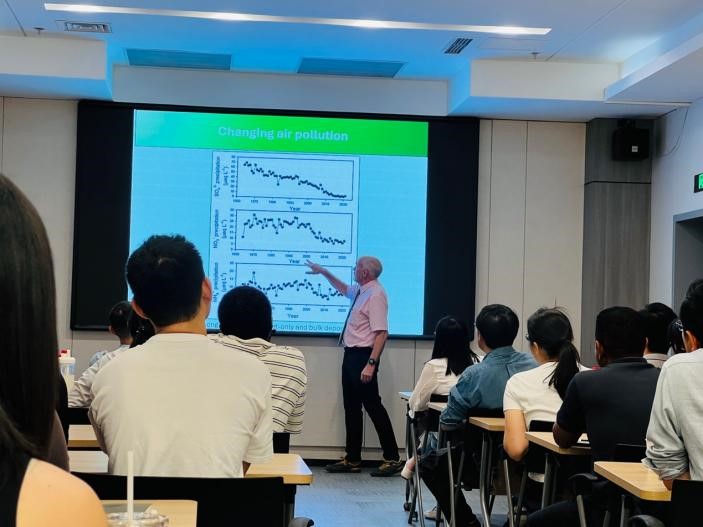Renowned U.S. Environmental Scientist Charles T. Driscoll Visits the Institute of Applied Ecology for Ecological Exchange
Charles T. Driscoll, a distinguished professor from Syracuse University and a member of the U.S. National Academy of Engineering, visited the Institute of Applied Ecology of the Chinese Academy of Sciences (CAS) in Shenyang from June 8 to 12, 2025, for a week-long academic exchange focused on ecosystem processes under climate change and pollution stressors.
During his visit, Driscoll delivered a keynote lecture titled “Effects of Changing Climate and Air Pollution on the Structure and Function of the Northern Forest: Long-Term Measurements and Experiments at the Hubbard Brook Experimental Forest, NH, USA.” Drawing on decades of research from the renowned Hubbard Brook site in New Hampshire, he emphasized the power of long-term, watershed-scale studies in tracking biogeochemical cycles and ecosystem function. Driscoll underscored the dual importance of empirical observation and model testing in predicting ecosystem responses to global environmental change.
He detailed how rising temperatures, altered precipitation patterns, reduced runoff, and shifts in snowpack dynamics align with both observational data and climate model projections. The discussion extended to the ecological impact of declining acid deposition and its implications for nutrient cycling in forest systems.
The seminar was co-hosted by the CAS Innovation Group for Ecosystem Carbon and Nitrogen Cycling and the Liaoning Provincial Key Laboratory of Stable Isotope Technology. Over 20 participants—including CAS researchers, visiting scholars from Ethiopia’s Ambo University, and graduate students—attended the session.
In addition to the formal presentation, Driscoll engaged in rich discussions with CAS scientists on the current frontiers in ecosystem research. Topics ranged from the coupling of carbon, nitrogen, and water cycles to the challenges of modeling ecosystem resilience under climate stress. Driscoll and his Chinese counterparts, including Professors FANG Yunting and KANG Ronghua, expressed strong interest in establishing long-term collaborative projects focusing on forest ecosystem responses to climate change.
On June 10, Driscoll visited the Qingyuan Forest Ecosystem National Observation and Research Station. Accompanied by Professor FANG, he toured warming experiment plots and multi-instrument forest platforms. On-site discussions covered experimental design and data interpretation, with Driscoll offering constructive feedback and commending the station's advanced infrastructure and methodological rigor.
This visit not only deepened mutual understanding between international researchers but also opened new pathways for Sino-American cooperation in the study of forest ecosystems in a rapidly changing world.

Charles T. Driscoll delivers a lecture at the Institute of Applied Ecology



